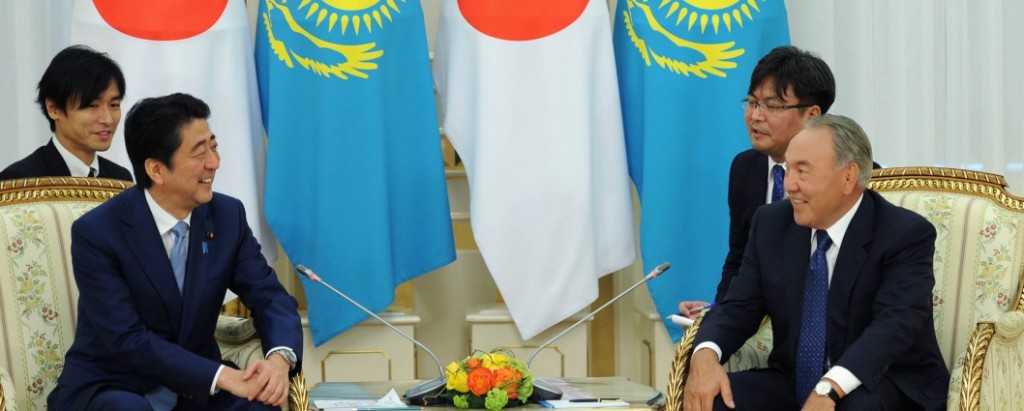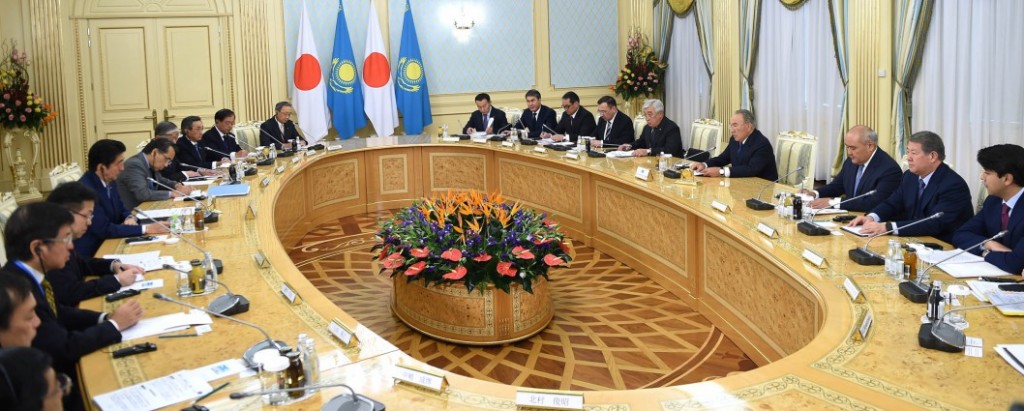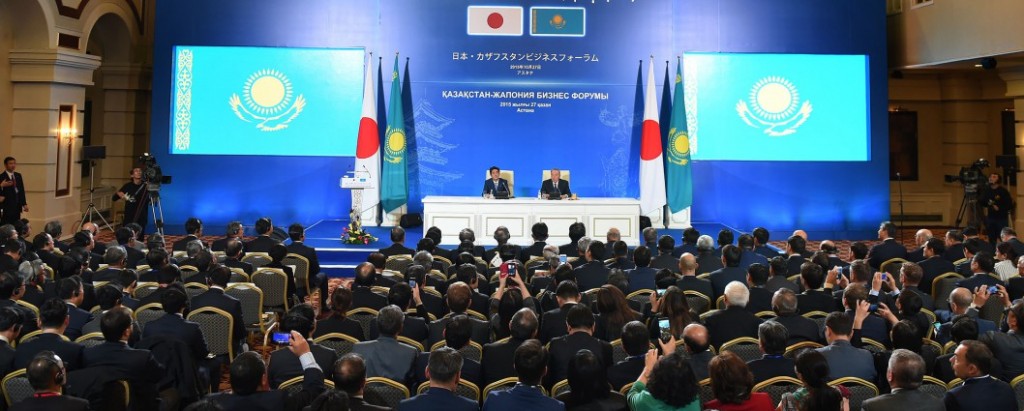ASTANA – President of Kazakhstan Nursultan Nazarbayev met with Japanese Prime Minister Shinzo Abe during the latter’s official visit to the Central Asian nation on Oct. 27.

Prime Minister of Japan Shinzo Abe (L) and President of Kazakhstan Nursultan Nazarbayev meet in the Akorda.
Nazarbayev congratulated Abe on his recent reelection and wished him continued success, especially in light of the current complicated economic situation in the world. He also expressed confidence that Abe’s first official visit to Kazakhstan will give a powerful impetus to the strategic partnership between Astana and Tokyo and bring it to a qualitatively new level.
“Despite Kazakhstan and Japan being distant neighbours, we are very close friends. The comprehensive development of relations with your country is one of the most important priorities of our foreign policy since the early days of our independence. Over all these years, Astana and Tokyo have been reliable partners. We always support each other; we have a lot in common. We are allies in nuclear disarmament, nonproliferation and the peaceful use of nuclear energy. A symbol of friendship between our countries is our capital, Astana, which was designed by outstanding Japanese architect Kisho Kurokawa,” Nazarbayev said at the start of the talks in the Akorda.
The parties discussed economic cooperation between the two countries. During the years 2013-2014, trade turnover between the countries amounted to about $2 billion, and in the first half of 2015 it reached $600 million. Over the past 10 years, Japanese investment in the economy of Kazakhstan amounted to about $5 billion, according to official Kazakh statistics.
“A number of major Japanese companies are actively working in Kazakhstan. Fifty joint ventures are functioning, six joint projects worth more than $700 million have been accomplished, and another 10 projects are underway. I am confident that the entry into force from Oct. 25 of the bilateral agreement on encouragement of mutual protection of investments will significantly strengthen the legal basis of our relations,” said the Kazakh President.
“In recent years Japanese companies have started to actively operate in Kazakhstan’s market in exploration and extraction of natural resources, as well as the production industry,” said the Japanese prime minister. Abe said that the strengthening of the legal framework for bilateral trade and economic relations, as well as Kazakhstan’s entry into the World Trade Organisation, significantly expand the opportunities for the realisation of large joint investment projects and cooperation in general.
“Kazakhstan intends to cooperate with your country in all directions. Your tour of the Central Asian countries is important and timely. We support and believe it is necessary to [develop] the format of interaction ‘Central Asia plus Japan,’” said Nazarbayev.
 Abe noted that this was the two leaders’ fourth meeting. “And it gives me great joy that on the basis of close relations, we are actively developing our relations,” he said.
Abe noted that this was the two leaders’ fourth meeting. “And it gives me great joy that on the basis of close relations, we are actively developing our relations,” he said.
Abe also noted that he arrived in Kazakhstan with a delegation representing the business community.
“Although Kazakhstan is the last stop on Abe’s regional tour, it is perhaps the most important. In Astana, Abe will outline Japan’s Central Asia policy. Japan has no hope, and probably no desire, to supplant Russian or Chinese influence in the region. But, Japan looks willing to step in as another option, in addition to bringing to the region a high degree of technical expertise and experience,” according to a report by The Diplomat online magazine about the visit.
The business forum in the framework of the visit provided an additional platform for deepening cooperation. Presidents of the largest Japanese companies took part in the talks in the expanded format. They confirmed their desire to work with their Kazakh counterparts.
“We think that our cooperation in the exploration of rare earth metals, nuclear power, the banking sector, transport and agriculture is very important,” said Nazarbayev at a joint press conference in the Akorda.
“We see three areas of cooperation with Kazakhstan. At first, Japan will continue to support economic reforms in Kazakhstan. We agreed that we should work together in the field of transport and logistics,” said Abe.
“The Japanese government will push for private investment and will support infrastructure building as well as human resource development. By doing so, business opportunities surpassing 3 trillion yen ($24.9 billion) will be created,” the Japanese prime minister added.
He also noted that he would like to develop interaction through sports and culture. “We will suggest Japanese shows, strengthen training in the Japanese language, as well as develop communication in sports and so on. I hope that the results of this meeting will contribute to further strengthening friendly relations between our countries,” Abe concluded.
During the busy day, the Japanese prime minister and the President of Kazakhstan visited Nazarbayev University, where Abe gave a lecture to students and faculty. He noted the importance of training in the process of the industrial upgrade of Kazakhstan, in which Japan is ready to provide active assistance.
“We will continue to support Kazakhstan though the training of qualified personnel in the field of industry,” said the Japanese prime minister.

Prime Minister of Japan Shinzo Abe and President of Kazakhstan Nursultan Nazarbayev at the Kazakhstan-Japan Business Forum in Astana.
He also told Kazakh students about plans to build nuclear power plants in Kazakhstan, which remain not yet finalised by the Kazakh government. The project is designed taking into account lessons from the 2011 accident at the Fukushima nuclear power station in Japan, therefore it has to be the most secure in the world, he added.
At the end of the lecture, Abe was awarded an honorary doctorate from Nazarbayev University.
On the same day, the Kazakh-Japanese business forum took place in Astana, attended by representatives of about 100 Japanese companies working in the economy, aviation, aerospace, the auto industry, electronics, chemicals, finance and real estate, as well as forwarding and transportation, the food industry, health and others. These included representatives of the Sumitomo Mitsu Banking Corporation, Toyota Tsusho Corporation, Cokey Systems Co. LTD and other Japanese companies.
The sides discussed issues of further trade, economic and investment cooperation, and signed a memorandum of cooperation between Kazakhstan and Japan in agriculture and agricultural machine engineering, the creation of a car terminal and a number of other documents.
Kazakhstan and Japan established diplomatic relations in 1992. The two nations maintain a regular political dialogue at the high level and conduct political consultations.

